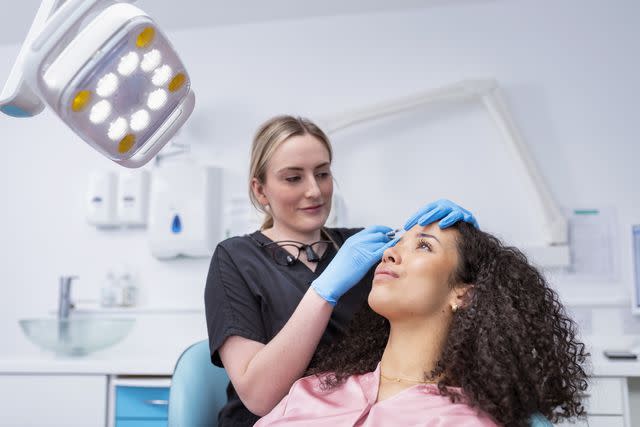Counterfeit Botox Injections Have Sickened Patients in Several States—Here's What to Know
Fact checked by Nick Blackmer
The Food and Drug Administration (FDA) and Centers for Disease Control and Prevention (CDC) have warned that counterfeit Botox products have sickened patients across the U.S.
A total of 22 people have reported botulism-like symptoms after receiving Botox injections outside of a healthcare setting.
These illnesses highlight the need for patients to carefully vet their providers, if they choose to get injections.
U.S. authorities have warned that counterfeit Botox products have sickened people around the country after receiving the injections.
A total of 22 people reported symptoms after receiving botulinum toxin injections, according to the Centers for Disease Control and Prevention. The incidents occurred in California, Colorado, Florida, Illinois, Kentucky, Nebraska, New Jersey, New York, Tennessee, Texas, and Washington.
All but two of the people who had reactions received the injections for cosmetic purposes. All 22 got them from unlicensed or untrained people in non-healthcare settings like homes and spas.
Eleven people went to the hospital. A total of six were treated with botulism antitoxin out of concern that the botulinum toxin, which is the same toxin that causes the rare but potentially lethal food poisoning botulism, could have spread beyond the injection site.
The Centers for Disease Control and Prevention notes that people experienced symptoms similar to that of botulism: blurry vision, general weakness, difficulty swallowing, trouble breathing, drooping eyelids, dry mouth, slurred speech, and fatigue.
“These complications underscore the urgent need for patients to carefully understand who they are selecting to perform botox procedures,” Seemal R. Desai, MD, president of the American Academy of Dermatology Association, said in a statement.
The FDA, as well as several state and local health departments, are investigating the source of the products.
According to the FDA, the counterfeit product shares some similarities with the FDA-approved brand Botox manufactured by AbbVie, but the agency said there’s no indication that the two are linked.

Monty Rakusen / Getty Images
What Exactly Is Botox—and How Might Phony Versions Cause Illness?
Botox is a drug made from botulinum toxin produced by the bacterium Clostridium botulinum. The toxin prevents muscles from moving and is used to temporarily smooth facial wrinkles. It can also be used for medical purposes, such as to treat excessive sweating or migraines.
In addition to approving the brand Botox, the FDA has approved other brands of botulinum toxin injections, including Dysport, Xeomin, and Jeuveau (though people tend to refer to them all as Botox). When used correctly, the toxin injections are generally safe.
Michael C. Cameron, MD, an assistant clinical professor of dermatology at Mount Sinai Health System, told Health that FDA-approved products are precisely formulated so that the botulinum toxin is diluted enough to prevent someone from getting botulism.
Meanwhile, black market versions may sicken people because manufacturers fail to properly dilute the neurotoxin.
“‘[Counterfeit manufacturers] don’t have the procedures in place to produce in large quantities the right dilution of the toxin,” said Cameron. “They’re trying to develop a knockoff product and they don’t have the expertise to do it.”
Cameron said it’s unlikely that improper handling caused the illnesses. That’s more likely to result in a product simply not working, he said, rather than people coming down with botulism-like symptoms.
If someone does have contact with botulism, they may initially feel weakness in the muscles controlling parts of the face before it spreads to the neck, arms, torso, and legs. The weakness can cause difficulty breathing.
Related: Zinc and Botox: Can the Supplement Really Make Your Treatment Last Longer?
How to Ensure That Botox Is Legitimate
Experts said that picking the right provider is critical when it comes to getting Botox injections.
They recommend going to a board-certified dermatologist, plastic surgeon, or oculoplastic surgeon for injections for cosmetic purposes. If you visit a non-physician clinician, be sure they’re properly trained and working under the supervision of a board-certified dermatologist on site, Desai said in the statement.
If you need Botox for medical purposes, Cameron said other doctors, such as neurologists, can administer it in their offices.
According to Desai, doctors must stick to stringent standards to protect patient safety. These relate to the types of materials used, where they come from, and how they are handled.
If you’re unsure if your provider has the requisite experience, the CDC recommends asking them whether they’re licensed and trained to give the injection.
It’s also essential to find out more about the product itself. Ask whether it’s approved by the FDA and obtained from a reliable source. And, as an added precaution, there’s no harm in asking to see the vial or packaging, added Cameron.
For more Health.com news, make sure to sign up for our newsletter!
Read the original article on Health.com.

